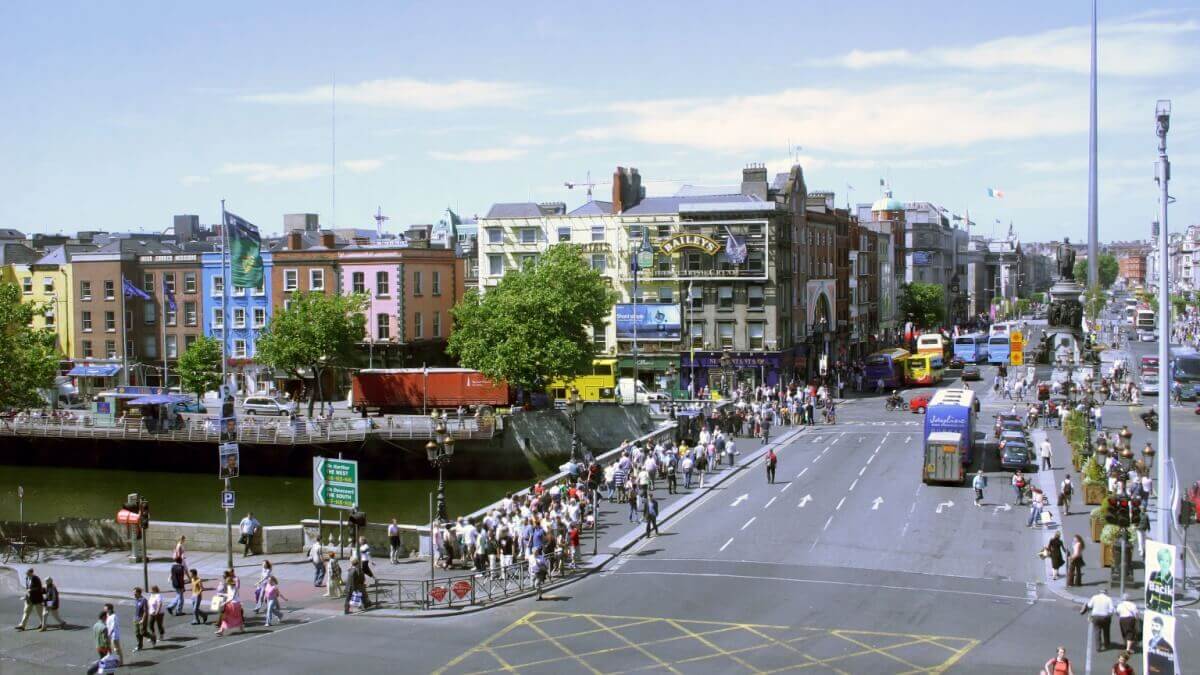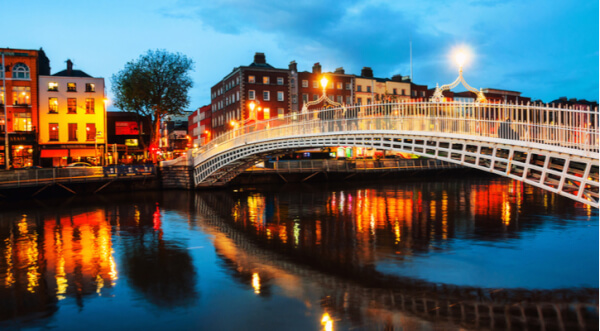Your guide to child maintenance in Ireland.
Child maintenance in Ireland is complicated — read on to learn what you need to know.

The Emerald Isle, known for its lush green landscapes, cheerful culture and rich heritage, Ireland has much to offer to new and old residents alike.
With bustling cities and quaint villages aplenty, Ireland's picturesque countryside and welcoming atmosphere make it an enticing prospect for many seeking a new life abroad.
Whether you’re moving for work, wanting to retire or using Ireland as your base for a gap year overseas, this guide covers all the essentials. From visa types to healthcare, finding work, safety and more we’ve got the details you need to know about moving to Ireland from Australia.
| 💸 Keep 40+ currencies and get personalised account details for currencies like AUD, EUR, USD, GBP & CAD – Send and receive payments from abroad like a local |
|---|
Learn more about the
Wise Account
Before we dive deep into the details of moving from Australia to Ireland, let’s start with a look at some of the key facts.
Please note that we’re focusing on the Republic of Ireland rather than Northern Ireland for this guide. However, we have included some details for Northern Ireland in the table indicated with (N).
| Capital | Dublin |
|---|---|
| Official languages | English, Irish |
| Population | 7.185 million (combined Republic & Northern) |
| Currency | Euro (EUR, Republic), Pound (GBP, Northern) |
| Biggest cities | Dublin, Belfast(N), Cork, Limerick, Galway, Derry (N), Bangor (N), Waterford |
| Weather | Ireland is considered to have a temperate maritime climate. This means mild to warm summers with an average temp of 14-16 degrees and cooler winters averaging temps of between 4-8 degrees. There is a high chance of precipitation (rain) all year round. |
| Government type | Parliamentary Republic |
| Average yearly salary (2022)¹ | EUR€52,971 |
As seen on 15 October 2024
With a blend of rich cultural heritage, stunning landscapes and modern living, Ireland offers a relaxed lifestyle with a deep appreciation for music, literature, and history. The country's beautiful scenery includes rolling green hills, rugged coastlines, and historic landmarks like castles and ancient ruins.
Cities like Dublin, Cork, and Galway are vibrant, with a mix of traditional pubs, lively arts scenes, and modern amenities. When it comes to employment, Ireland's economy is strong, with low unemployment rates and a variety of good job opportunities available across multiple sectors.²
The weather is often cool and rainy, which while not always ideal, does make for plenty of opportunities to enjoy Ireland's famous pub scene. Cosy and a great place to connect, they’re almost akin to community centres with games, lively music and more to enjoy.
Importantly, alongside its lush countryside, stunning coastlines and welcoming inhabitants, Ireland is a safe country that also offers a great work-life balance, fantastic education and high-level healthcare.²
Below is a brief rundown of the pros and cons of moving to and living in Ireland.
| Pros | Cons |
|---|---|
|
|
Before moving to Ireland to live, it is worth noting that specific criteria must be met. These include³:
Whether you intend to work, settle or study, if you are wanting to stay in Ireland for longer than 3 months, you’ll need to apply for a long-stay ‘D’ visa.⁴
There are multiple visa types within this category to choose from based on your needs, these being⁵:
Available to apply for once you have secured a work permit, this visa permits skilled workers to live and work in Ireland for an extended period.
You’ll need to apply for this visa at least three months in advance of your arrival and proof of health insurance, relevant qualifications, proof of employment in Ireland and more will be required.⁵
If you are hoping to retire in Ireland you must be financially independent and meet several strict conditions. You will be unable to access any state benefits such as a pension or public healthcare that is provided to other residents.⁶
Significant proof of financial means is required, such as showing an income of at least EUR€50,000 per year plus evidence of a large lump sum in savings for emergencies.⁶
This visa is for any students planning to live and study in Ireland for more than 3 months. Alongside proof of enrolment and acceptance at your chosen university, you will also need to provide documentation outlining your accommodation arrangements, health insurance, evidence of academic ability and more.⁷
Once you are issued with your long-stay ‘D’ visa, no matter which category, you must also register for and obtain an Irish Residence Permit (IRP).⁴
If working, you will also be required to get an Employment Permit before you can apply for a work visa. This is available through the Department of Enterprise, Trade and Employment.⁵
Ireland is a very safe place for Australians to live in. Like most countries, petty crimes such as bag snatching and pickpocketing can be present in major cities, but there is a low risk of violent crime. There is an increase in car theft and break-ins though, so it’s advised to take precautions.
Smartraveller recommends avoiding any political rallies or public protests or gatherings that may become violent and follow the advice of local authorities.³
English is an official language in Ireland and therefore widely spoken, making it an easy transition for most Aussies.
However, Irish, the historic, Celtic language of Ireland and its many dialects are also spoken in many regions. Many names for both people and places will be spelt in a traditional Irish fashion and many Irish words are used in English by locals too.
This means that while learning Irish as an expat is not especially necessary, it can be very beneficial to understand the basics. Not only is this respectful, but it can also help you avoid any embarrassing faux pas when pronouncing people's names.
Healthcare in Ireland is largely on par with Australia in terms of standard of care facilities available with many local clinics, hospitals and health centres to choose from.
Like Australia, Ireland also offers a universal health system, with both public and private options available. As an expat that intends to live in Ireland for more than a year and obtained a residency permit, you will be entitled to access a range of public health services either free of charge or at a reduced cost.⁸
As not all services are free or accessible and choice can be limited depending on your circumstances and eligibility, private healthcare insurance is still recommended.
Ireland is often considered to have a relatively high cost of living compared to some other nations in Europe, however, it's currently lower than in Australia by around 5.9% on average overall. This can differ if living in major cities when it comes to costs such as rent though.
The following table outlines the monthly average living expenses for a couple living in a one-bedroom apartment in some of the most popular cities in the Irish Republic.⁹
All prices are quoted in Euros. 1 EUR = 1.62412 AUD on the 17th Oct 2024. See current rate here
| Dublin | Cork | Limerick | Galway | |
|---|---|---|---|---|
| Rent | €2015 | €1541 | €1700 | €1608 |
| Utilities (electricity, phone, internet) | €341 | €284 | €225 | €277 |
| Groceries | €550 | €614 | €605 | €560 |
| Transport (public, monthly pass) | €115 | €91 | €40 | €60 |
As seen on 15 October 2024
Finding employment in Ireland follows much the same pathway as you would be familiar with in Australia with most jobs posted publicly and applied for online.
Depending on the type of work you are after or your qualifications, you may like to pursue work via several avenues including:
As stated most job listings will be placed online, the most popular websites for job postings in Ireland include:
Speaking with a recruitment agency, particularly one that specialises in your area of expertise can be beneficial. Most recruitment agencies will be actively seeking candidates and often from a global talent pool, making it easier and faster to find the right job.
Researching employers you’d like to work for and contacting them directly to ask about job opportunities can also be worth a try. Even if they are not advertising on a job platform or their own website, you never know when they might be open to hiring new talent.
Attending any job recruitment fairs or industry events relevant to your area of expertise can be ideal for sourcing job leads. Providing insights into new or upcoming opportunities, job expos are regularly held in the country's capital cities with dates available online.
Helpfully, these events are also a great way to network and meet new people when in a new city.
Opening an Irish bank account is recommended for anyone intending to live there long-term. Making it easier to receive a salary and manage everyday expenses, the top retail banks to consider include:
Again, following similar practices to what you’d expect in Australia, applying for a bank account typically requires proof of ID, proof of address and other personal information to be provided.
Each of these banks offers different account products types to choose from and may have different rules depending on your residency status or visa type. As such, we recommend shopping around to find the right fit for your needs.
Relocating to Ireland represents an exciting opportunity for any Australian, however, before you make such a big move, you should consider:
Should you need to speak with an Irish embassy or consulate in Australia about your proposed move, you can contact them at their main offices as follows:
20 Arkana St, Yarralumla ACT 2600
(02) 6214 0000
Level 26/1 Market St, Sydney NSW 2000
(02) 9273 8500
Moving to Ireland from Australia offers an enriching experience with its welcoming culture, vibrant cities and breathtaking landscapes.
While the climate and pace of life may differ a little from Australia, for those seeking a change and adventure, Ireland has plenty to recommend it. Whether for work, study or to retire, you never know, Ireland may just be the pot of gold at the end of the rainbow you’ve been hoping to find.
Opening a bank account overseas can be a bit of a process that’s made more difficult if you aren’t considered a resident yet.
The Wise Account from Wise — while not a bank account — enables you to store 40+ international currencies and get local account details for a number of different countries, including AUD, CAD, GBP, NZD, EUR and USD. You can use these to easily transfer your money to Wise or get paid by others. However, do note that features that are offered by traditional bank accounts such as interest, loans and in some countries, deposit protection, will not be available with the Wise Account. See how Wise safeguards your money.
You’ll also avoid high international transaction fees and get access to the mid-market rate on all conversions. The best part - you can open and manage your Wise account completely online.
To make everyday spending easier you can order a Wise Debit card for your Wise Account and generate virtual cards as needed. If you have the local currency in your Wise Account the Wise card will use it. If you don’t have local currency converted, it uses smart technology to auto-convert your money at the mid-market rate, for a transparent conversion fee.
Join over 16 million customers currently using Wise.
Register your Wise Account
in minutes
Please see Terms of Use and product availability for your region or visit Wise Fees & Pricing for the most up to date pricing and fee information.
Sources:
Sources checked on: 08 October 2023
*Please see terms of use and product availability for your region or visit Wise fees and pricing for the most up to date pricing and fee information.
This publication is provided for general information purposes and does not constitute legal, tax or other professional advice from Wise Payments Limited or its subsidiaries and its affiliates, and it is not intended as a substitute for obtaining advice from a financial advisor or any other professional.
We make no representations, warranties or guarantees, whether expressed or implied, that the content in the publication is accurate, complete or up to date.

Child maintenance in Ireland is complicated — read on to learn what you need to know.

Having a baby is a priceless experience, but if you’re a foreigner in a different country, it can be daunting to navigate new healthcare systems and impending...

Ireland is known for its love of food and drink, picturesque countryside and bustling cities. Read on to find out the pros and cons of living in Ireland.

Roaming around Ireland is the fantasy of many, driving through the beautiful green countryside and stopping for a pint in any of the country’s quaint small...

If you’re an expat living in the Republic of Ireland, you might be considering taking up an Irish citizenship. There are some clear benefits to this. Becoming...

Ireland boasts a thorough public health system, with heavily subsidised care for almost everyone in the country. But some complex aspects to the system can...